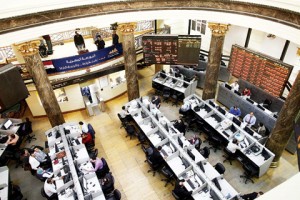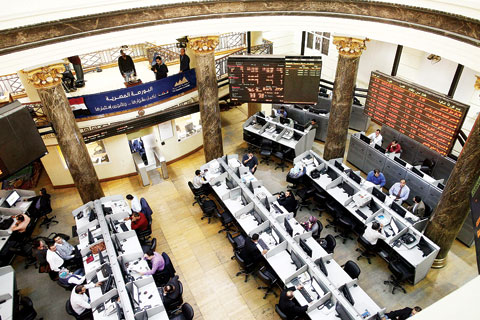
(AFP Photo)
By Farah Atia
Orascom Construction Industries S.A.E (OCI), the biggest listed company in Egypt’s stock exchange, was the third biggest gainer in Tuesday trading, as it received a tender offer from its Dutch-based mother company to buy the 30% stake in Egypt-listed shares which it does not own, a move that could lead to Orascom’s delisting from the local bourse.
OCI shares rose 1.8% to EGP 234 at close today, according to data on the stock exchange’s website. “Around 80% of OCI’s operations are already abroad, so the sale won’t have a significant impact on the company structure,” according to Abdelwahab Al-Salawy, Board member in Economic Group For securities.
Orascom said Monday it had received a tender buyout offer from OCI N.V., a global nitrogen based fertiliser producer and engineering and construction contractor based in the Netherlands. According to OCI’s statement to the bourse, OCI N.V. had formally submitted on Monday updated documentation to the Egyptian Financial Supervisory Authority (EFSA) to launch a tender offer on all OCI shares traded in the Egyptian Stock Exchange. As per the offer, OCI N.V. will present all OCI shareholders with an offer to convert their shares to OCI N.V., or a cash alternative of EGP 255 per share, down from a 280 EGP offer the company had made in January.
OCI called on its shareholders to meet on 19 June, as per EFSA’s request, to vote on a range of issues related to the share exchange offer.
The buyout deal was first announced last January, when Dutch company OCI N.V. offered the holders of OCI’s global depositary receipts (GRDs) shares in OCI N.V., while offering holders of the company’s Egypt-listed ordinary shares the option of either EGP 280 in cash per share or OCI N.V. shares. OCI S.A.E. had to first resolve a tax dispute with the Egyptian Tax Authority in April by agreeing to pay $1bn dollars over 5 years to be able to proceed with the sale. The payments started in May and will end in 2017.
The wider EGX 30 benchmark index had dropped by 1.57% at the end of trading yesterday (Tuesday). “The main reason for the decline in the benchmark market index is the lack of political stability especially with possible protests on June 30th,’’ Al-Salawy said. “Egyptians and foreigners alike find it very risky to invest in the Egyptian stock market, as a result, stock prices across all industries are undervalued.’’
Egypt’s liberal and secular opposition groups are calling for nationwide protests on June 30, which marks the first yearly anniversary in the reign of President Mohamed Morsi whom they seek to topple along with calling for early presidential elections.



